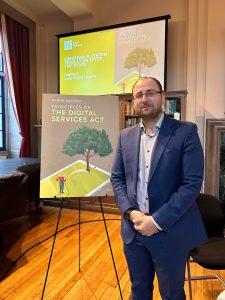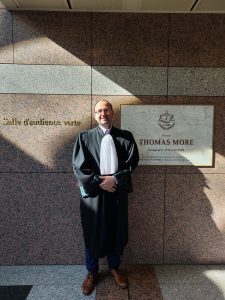Martin Husovec is an academic and jurist. He works as an Associate Professor of Law at The London School of Economics and Political Science (LSE) and is a licensed attorney in Slovakia. Martin authored numerous books, research articles, and advised legislatures and judiciaries. He was also involved as a legal counsel for NGOs defending the public interest in several European high-profile cases dealing with digital liberties and platform regulation.
Academic
Martin Husovec’s [pronounced Husovets, or Husoveck] academic scholarship deals with questions of innovation policy and digital liberties, particularly intellectual property law, platform regulation, and freedom of expression. His work on intellectual property and platform regulation is cited widely. Martin’s latest work is the book, Principles of the Digital Services Act (Oxford University Press, 2024). His previous books treated questions of injunctions against intermediaries (CUP, 2017), and liability of internet intermediaries (CZNIC, 2014). In 2024, he founded Platform Regulation Academy, which offers leading online courses on the EU Digital Services Act (see the DSA Specialist Masterclass). Martin’s work has been repeatedly cited by Advocate Generals at the Court of Justice of the European Union.

Martin obtained his PhD from the Max Planck Institute for Innovation and Competition and Ludwig Maximilian University in Munich for his work on injunctions against intermediaries (published with Cambridge University Press, 2017). Between 2015-2020, he was an Assistant Professor at Tilburg University, the Netherlands, appointed jointly by Tilburg Institute for Law, Technology, and Society (TILT) and Tilburg Law and Economics Centre (TILEC). He held visiting appointments at Stanford Law School (2014), the Japanese Institute for Intellectual Property (2015), the Central European University (2018), the European University Institute (2018), and Cambridge University (2019). He is a fellow at CREATe, and TILEC, and a member of the European Copyright Society (ECS), a group of prominent European copyright scholars.
Jurist
Martin has filed a number of amicus curiae briefs or third-party interventions before the European Court of Human Rights in key cases dealing with digital freedom of expression. He also represented NGOs that intervened in digital technology cases to support the public interest before the Court of Justice of the European Union. Martin previously acted as an advisor to the President of the Slovak Constitutional Court, national ministries in Europe and Asia, and various EU institutions in the areas of intellectual property, freedom of expression, and privacy.

In the 2010s, Martin co-founded the European Information Society Institute (EISi), which spearheaded the data retention complaint in Slovakia, resulting in the invalidation of the Slovak implementation (PL. ÚS 10/2014). As part of EISi, he also co-founded a Slovak alternative dispute resolution system for the TLD sk (see adr.eisionline.org). In recent years, has advised the judges of the Slovak Constitutional Court in several important cases, including eKasa (PL. ÚS 25/2019) and Covid data (PL. ÚS 25/2019). In 2024-2025, Martin was a rapporteur of the Council of Europe Committee of Experts on online safety and empowerment of content creators and users (MSI-eSEC). In 2025, he also authored the modernisation of the Slovak unfair competition law, which is currently being incorporated into the effort to recodify the Slovak civil law.
History enthusiast
Martin has a deep interest in history, which is why he helps people with Slovak heritage to reconnect with the country of their ancestors. Martin’s wife, Lucia, runs a Zip-Citizenship consultancy that helps people with Slovak roots to become Slovak and EU citizens. Martin and the team of specialised attorneys steps in whenever needed.